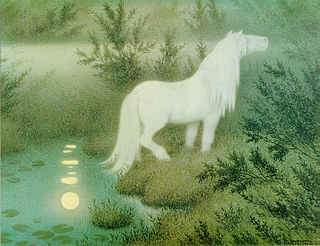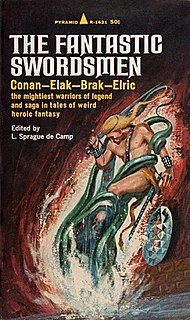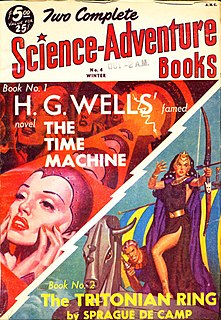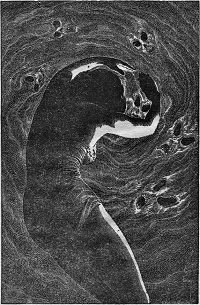Plot summary
The sorcerer Derezong Taash, in the service of King Vuar the Capricious of Lorsk, is ordered to steal a magical gem from the temple of the goddess Tandyla in Lotri. The jewel is set as an eye in the goddess's statue. Together with his apprentice Zhamel Seh, Taash undertakes the errand, which goes suspiciously well; its guardians almost seem to want it stolen, while the gem itself appears to want to stay with him. With a sense of foreboding, Taash decides he must return his prize to the temple while tricking the king into thinking he has truly supplied it, thus becoming unwittingly embroiled in a plot against the throne that reaches to the very heart of the royal family.
Chronologically, "The Eye of Tandyla" is the second of de Camp's Pusadian tales, and the first to feature his protagonists Derezong Taash and Zhamel Seh. [1] It is set some generations after The Tritonian Ring , King Vuar of Lorsk being stated in the book to be a descendant of that novel's King Zhabutir.

Lyon Sprague de Camp was an American writer of science fiction, fantasy and non-fiction. In a career spanning 60 years, he wrote over 100 books, including novels and works of non-fiction, including biographies of other fantasy authors. He was a major figure in science fiction in the 1930s and 1940s.

A fantasy world is a world created for/from fictional media, such as literature, film or games. Typical fantasy worlds involve magic or magical abilities, nonexistent technology and sometimes, either a historical or futuristic theme. Some worlds may be a parallel world connected to Earth via magical portals or items ; an imaginary universe hidden within ours ; a fictional Earth set in the remote past or future ; an alternative version of our History ; or an entirely independent world set in another part of the universe.

The "Harold Shea" Stories is a name given to a series of five science fantasy stories by the collaborative team of L. Sprague de Camp and Fletcher Pratt and to its later continuation by de Camp alone, Christopher Stasheff, Holly Lisle, John Maddox Roberts, Roland J. Green, Frieda A. Murray, Tom Wham, and Lawrence Watt-Evans. De Camp and Stasheff collectively oversaw the continuations. The series is also known as the "Enchanter" series, the "Incomplete Enchanter" series or the "Compleat Enchanter" series.

The Reluctant Shaman and Other Fantastic Tales is a collection of short stories by American science fiction and fantasy author L. Sprague de Camp, first published in paperback by Pyramid Books in November 1970. An E-book edition was published by Gollancz's SF Gateway imprint on September 29, 2011 as part of a general release of de Camp's works in electronic form. The pieces were originally published between 1939 and 1958 in the magazines Thrilling Wonder Stories, Unknown, and Fantastic Universe. The collection has also been translated into French and German.

The Tritonian Ring and Other Pusadian Tales is a 1953 collection of stories by American science fiction and fantasy author L. Sprague de Camp, first published in hardcover by Twayne Publishers. An E-book edition was published as The Tritonian Ring and Other Pasudian [sic] Tales by Gollancz's SF Gateway imprint on September 29, 2011 as part of a general release of de Camp's works in electronic form. The pieces were originally published between 1951 and 1953 in the magazines and anthologies Two Complete Science Adventure Books, Fantasy Fiction, Imagination Stories of Science and Fantasy, and Fantastic Adventures. The title story, the novel The Tritonian Ring has also been published separately.

Conan the Swordsman is a collection of seven fantasy short stories and associated pieces written by L. Sprague de Camp, Lin Carter and Björn Nyberg featuring Robert E. Howard's sword and sorcery hero Conan the Barbarian. It was first published in paperback by Bantam Books in August 1978, and reprinted in 1981. Later paperback editions were issued by Ace Books. The first hardcover edition was published by Tor Books in December 2002. The first British edition was issued by Sphere Books in 1978. The book has also been translated into Italian and French. It was later gathered together with Conan the Liberator and Conan and the Spider God into the omnibus collection Sagas of Conan.

Tales of Conan is a 1955 collection of four fantasy short stories by American writers Robert E. Howard and L. Sprague de Camp, featuring Howard's sword and sorcery hero Conan the Barbarian. The tales as originally written by Howard were adventure yarns mostly set in the Middle Ages; they were rewritten as Conan stories by de Camp, who also added the fantastic element. Three of the stories also appeared in the fantasy magazine Fantastic Universe, two of them before publication of the collection and the other one after. The book has also been translated into Japanese. The collection never saw publication in paperback; instead, its component stories were split up and distributed among other "Conan" collections. "The Flame Knife" was later also published as an independent paperback.

The Fantastic Swordsmen is a 1967 anthology of fantasy short stories in the sword and sorcery subgenre, edited by American writer L. Sprague de Camp. It was first published in paperback by Pyramid Books. It was the third such anthology assembled by de Camp, following his earlier Swords and Sorcery (1963) and The Spell of Seven (1965). It has also been translated into German.

The Pusadian series is a sequence of fantasy stories by L. Sprague de Camp, begun in the early 1950s and written under the influence of Robert E. Howard's Conan stories. The series, also known as the Poseidonis series, prefigured the numerous sword & sorcery settings of the 1960s and 1970s.

The Tritonian Ring is a heroic fantasy novel written by L. Sprague de Camp as part of his Pusadian series. It was first published in the magazine Two Complete Science Adventure Books for Winter, 1951, and first appeared in book form in de Camp's collection The Tritonian Ring and Other Pusadian Tales. Its first publication as a stand-alone novel was as a paperback by Paperback Library in 1968; the first hardcover edition was from Owlswick Press in 1977. An E-book edition was published as The Tritonian Ring and Other Pasudian [sic] Tales by Gollancz's SF Gateway imprint on September 29, 2011 as part of a general release of de Camp's works in electronic form.

"The Owl and the Ape" is a fantasy story by American writer L. Sprague de Camp, part of his Pusadian series. It was first published in the magazine Imagination: Stories of Science and Fantasy for November, 1951, and first appeared in book form in the de Camp's collection The Tritonian Ring and Other Pusadian Tales. The story has also appeared in the anthology Kingdoms of Sorcery (1976). and the de Camp omnibus collection Lest Darkness Fall/Rogue Queen/The Tritonian Ring and Other Pusadian Tales (2014). It has also been translated into German.

"The Hungry Hercynian" is a fantasy short story by American writer L. Sprague de Camp, part of his Pusadian series. It was first published in the magazine Universe Science Fiction for December, 1953, and first appeared in book form in the anthology The Spell of Seven, edited by de Camp. It has also been translated into German, and was first brought together with other works of de Camp in the German collection Die Chronik von Poseidonis.
"The Stone of the Witch-Queen" is a fantasy short story by American writer L. Sprague de Camp, part of his Pusadian series. It was first published in the magazine Weirdbook for fall 1977. It has also been translated into Dutch and German. Chronologically, "The Stone of the Witch Queen" is the fifth of de Camp's Pusadian tales, and the third to feature his protagonist Gezun of Lorsk.

"Ka the Appalling" is a fantasy story by American writer L. Sprague de Camp, part of his Pusadian series. It was first published in the magazine Fantastic Universe for August, 1958, and first appeared in book form in the anthology The Young Magicians, edited by Lin Carter. It was first brought together with other works of de Camp in his collection The Reluctant Shaman and Other Fantastic Tales. It has also been translated into French, German, and Italian.
"The Rug and the Bull" is a fantasy short story by American writer L. Sprague de Camp, part of his Pusadian series. It was first published in the anthology Flashing Swords! #2, edited by Lin Carter. It has also been translated into Italian, German and Dutch.

"The Stronger Spell" is a fantasy short story by American writer L. Sprague de Camp, part of his Pusadian series. It was first published in the magazine Fantasy Fiction for November 1953, and first appeared in book form in de Camp's collection The Tritonian Ring and Other Pusadian Tales. It has since been reprinted in the anthology The Mighty Barbarians, edited by Hans Stefan Santesson. It was included in the omnibus de Camp collection Lest Darkness Fall/Rogue Queen/The Tritonian Ring and Other Pusadian Tales published in trade paperback by Gollancz in February 2014 and as an ebook by Gateway/Orion in March of the same year. It has also been translated into Dutch and German.

The Magic of Atlantis is an anthology of fantasy short stories, edited by Lin Carter. It was first published in paperback by Lancer Books in November 1970.
Bibliography of science fiction, fantasy, historical fiction and nonfiction writer L. Sprague de Camp:

"Nothing in the Rules" is a contemporary fantasy story by American writer L. Sprague de Camp.















